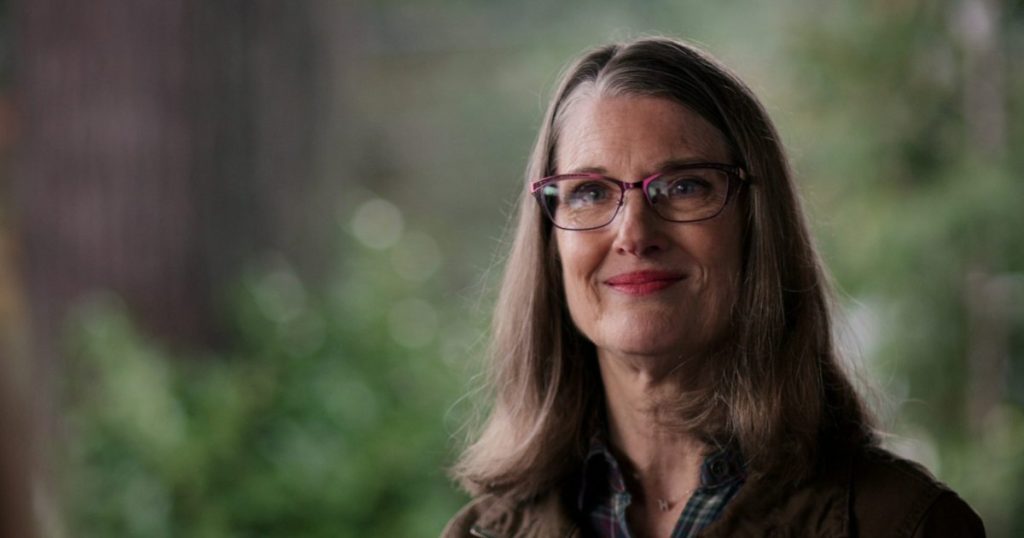Annette O’Toole, renowned for her portrayal of Hope McCrea in the popular Netflix series Virgin River, candidly discussed her character’s evolution in the sixth season, offering insights into the emotional nuances and comedic highlights that shaped Hope’s journey. One particularly memorable scene involved an unexpected visit from a stripper, originally intended for Mel’s bachelorette party, to Hope’s knitting circle. While the scene provided ample comedic fodder, it also held a bittersweet undertone as Hope’s close friend, Muriel, awaited a breast cancer diagnosis. O’Toole expressed her appreciation for the scene’s poignant portrayal of embracing life’s moments, particularly in the face of uncertainty, a sentiment especially resonant for older individuals. The scene served as a reminder to cherish each experience, as the future remains unpredictable.
O’Toole further elaborated on her fondness for the knitting circle scenes, highlighting the rich and complex lives of the older women involved. Their deep-rooted connection to their community and their ongoing navigation of personal challenges and relationships resonated deeply with her. These scenes showcased the vibrancy and resilience of older women, proving that life continues to be full of meaningful experiences and relationships regardless of age. The knitting circle served as a microcosm of the Virgin River community, reflecting the show’s emphasis on connection and support.
Beyond the lighthearted moments, season six delved into Hope’s past with the introduction of her ex-husband, Roland. This development presented a unique challenge for O’Toole, who had already crafted a personal history for Hope in her mind, envisioning her as a twice-widowed woman. Despite her initial surprise, she recognized the dramatic potential of this new storyline, acknowledging that it opened doors for future exploration in a potential seventh season. The re-emergence of Roland injected a new layer of complexity into Hope’s life, adding potential conflict and intrigue to her character arc.
While the future of Hope and Roland’s dynamic remains uncertain, O’Toole expressed enthusiasm for the potential narrative possibilities, emphasizing the importance of introducing challenges and conflicts to maintain audience engagement, especially in a long-running series. She believes that such obstacles provide opportunities for character growth and add depth to the storyline. This sentiment reflects the show’s commitment to portraying realistic and relatable challenges, even within a romantic setting.
In contrast to the complexities of her past relationship, Hope’s current relationship with Doc flourished in season six. O’Toole relished the opportunity to explore the romantic aspects of their connection, highlighting her on-screen chemistry with Tim Matheson, who portrays Doc. Their collaborative approach to their scenes, involving pre-scene discussions and filling in narrative gaps, allowed for a deeper and more authentic portrayal of their characters’ bond. This dedication to their craft contributed to the believability and emotional resonance of Hope and Doc’s relationship.
Despite the blissful moments in season six, O’Toole anticipates potential challenges for Hope and Doc in the upcoming season. The return of Roland, coupled with the precarious situation surrounding Doc’s medical practice, sets the stage for potential conflict and uncertainty. However, regardless of future obstacles, O’Toole expressed gratitude for the opportunity to portray Hope, a character she has come to admire over the past five years. She appreciates Hope’s strong will, outspoken nature, and capacity for deep emotions, traits she herself aspires to possess.
O’Toole defended Hope’s sometimes perceived "bossy" or "nosy" demeanor, interpreting it as a sign of the character’s genuine care and concern for her community. She credited showrunner Patrick Sean Smith for creating a balanced narrative that blends authentic storytelling with escapism. This balance, she believes, is what resonates with audiences, allowing them to connect with the characters and their struggles while also finding solace in the idyllic setting and heartwarming relationships within the Virgin River community. The show’s success lies in its ability to portray both the beauty and the challenges of life, creating a world that is both aspirational and relatable.

